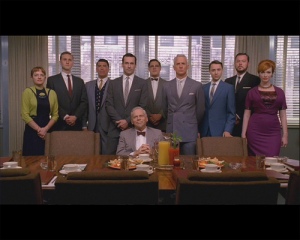Hello Patio, Hello lawsuit?
For the sake of argument let’s say that the Patio folks really liked Sal Romano’s Patio commercial. Let’s say they like it just the way it is. It’s an exact frame by frame copy of the opening sequence to the 1963 film “Bye Bye Birdie.” An Ann-Margret wannabe performs the opening scene of the movie with “Bye Bye Birdie” changed to “Bye Bye Sugar.”
Let’s further assume that the British bean counters at Putnam, Powell and Lowe (parent company of Sterling Cooper) were willing to stick a crowbar in their wallet and pay the appropriate licensing fees (which would pre-empt any copyright issues and could run anywhere from $10,000 to over $1 million in 2009 dollars. For the title song from one of 1963’s top grossing movies featuring one of the year’s hottest new stars, it could be closer to the top of the scale rather than the bottom.)
Let’s say it airs in prime time. Let’s say during “Bonanza.” Let’s say during “The Dick Van Dyke Show” and “American Bandstand.” Let’s say Ann-Margret sees the ad and has the same reaction Peggy Olson had.
That is to say she hates it.
In this hypothetical and fictional situation, Ann-Margret not only hates the ad, but she has never heard of Patio and wouldn’t drink “dietetic” soda on a bet. In 1963, what could she do?
Well, it depends on whether or not PepsiCo and Sterling Cooper asked her permission. (Ann-Margret on Mad Men! What a great episode that could be. Imagine Ann-Margret coming in for a meeting. It would make the epic American Airlines presentation in “Three Sundays” look like a tea party.)

But what if they didn’t bother to ask? What if they didn’t think they needed to? If Sterling Cooper didn’t get her permission, she could sue for violation of the right of publicity.
Simply put, the right of publicity is the right to control one’s identity. The most significant suits involving recognizable images of pop culture celebrities such as Jacqueline Onassis, Frank Sinatra, Bette Midler and Tom Waits didn’t arise until the 1980s. So, If Ann-Margaret sued Sterling Cooper in 1963, 20 years ahead of when the first suits were filed, it would have been the first in a series of important “impersonator” cases involving a celebrity asking for an injunction and/or monetary damages because their image was used in an advertisement without their permission. Ann-Margret Olsson v. Sterling Cooper would be a landmark right of publicity case that law students would still be studying 45 years later.
But suppose Sterling Cooper (wisely) decided to scrap the Patio ad, but decided to use the singer’s voice and the jingle with different visuals that didn’t include an Ann-Margret look-alike? Based on the outcomes of existing case law, Ann-Margret would again be a legal trailblazer a good 25 years before Midler filed her famous lawsuit against Young & Rubicam. In Midler v. Ford Motor Co. 849 F.2d 460 (9th Cir. 1989), Midler refused an offer to sing her hit song “Do You Wanna Dance” in an ad for the Mercury Sable. In a move that would make Bert Cooper proud, Y&R hired one of Midler’s back-up singers to perform the song in her stead. Several years later, Waits refused a smilar offer from Frito-Lay and a “sound-alike” was found to mimic his distinctive voice. (Waits v. Frito-Lay, Inc. 978 F.2d 1093 (9th Cir. 1992).
Both artists won their suits on right of publicity claims. Midler was awarded $400,000 and Waits received $2,500,00 several years later. The Midler case turned on her claim that the impersonation featuring her distinctive vocals would lead viewers to think that she was singing the song and therefore endorsing the car. And Ann-Margret’s vocals are nothing if not distinctive.
If Ann-Margret decided to sue, it’s likely she’d prevail in what could have been a multi-million dollar lawsuit (in today’s dollars) against Sterling Cooper, which could have been disastrous for the agency. And since series creator Matt Weiner has said he’d like to see the series move into the 1970s, it’s probably a good thing the Patio folks decided to pull the plug.



